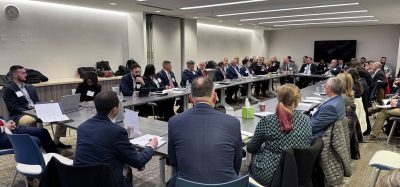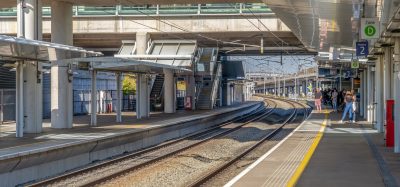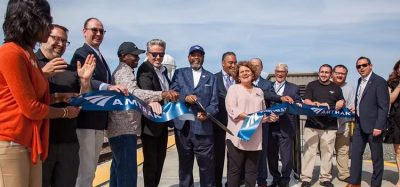Investment, improvement and modernisation at London Overground
Posted: 4 December 2013 | | No comments yet
Since 2007, London Overground Rail Operations Ltd (LOROL) has been actively transforming the London Overground network, modernising the service, improving facilities and providing a better, safer, more environmentally efficient and comfortable experience for its customers. And six years on, LOROL’s delivery of Transport for London’s (TfL’s) extensive investment in the network is proving to be a real winner.
The last couple of years, in particular, have been busy for LOROL. The challenge of unprece – dented passenger numbers during the London 2012 Olympic Games and the opening of the much anticipated East London Line extension last December to deliver the Capital’s first orbital railway in nearly 130 years are two key projects that the LOROL team has successfully delivered throughout this time. And with the project underway to increase the capacity of the network with the introduction of five-car trains from December 2014, the successful invest ment, improvement and modernisation activity at LOROL is on track to continue.
Since 2007, London Overground Rail Operations Ltd (LOROL) has been actively transforming the London Overground network, modernising the service, improving facilities and providing a better, safer, more environmentally efficient and comfortable experience for its customers. And six years on, LOROL’s delivery of Transport for London’s (TfL’s) extensive investment in the network is proving to be a real winner. The last couple of years, in particular, have been busy for LOROL. The challenge of unprece - dented passenger numbers during the London 2012 Olympic Games and the opening of the much anticipated East London Line extension last December to deliver the Capital’s first orbital railway in nearly 130 years are two key projects that the LOROL team has successfully delivered throughout this time. And with the project underway to increase the capacity of the network with the introduction of five-car trains from December 2014, the successful invest ment, improvement and modernisation activity at LOROL is on track to continue.
Since 2007, London Overground Rail Operations Ltd (LOROL) has been actively transforming the London Overground network, modernising the service, improving facilities and providing a better, safer, more environmentally efficient and comfortable experience for its customers. And six years on, LOROL’s delivery of Transport for London’s (TfL’s) extensive investment in the network is proving to be a real winner.
The last couple of years, in particular, have been busy for LOROL. The challenge of unprece – dented passenger numbers during the London 2012 Olympic Games and the opening of the much anticipated East London Line extension last December to deliver the Capital’s first orbital railway in nearly 130 years are two key projects that the LOROL team has successfully delivered throughout this time. And with the project underway to increase the capacity of the network with the introduction of five-car trains from December 2014, the successful invest ment, improvement and modernisation activity at LOROL is on track to continue.
An Olympic success
LOROL played a key role in the delivery of outstanding transport performance during the London 2012 Olympic and Paralympic Games. We ran the most intensive train services that the network has ever run and carried more people than ever before.
Approximately 2.8 million passengers were carried during the first week of the Games alone, and over the four week period of the London Olympics, 11.2 million people travelled on 29,000 trains on the Overground network. This represented a 45% increase in passenger volumes for us compared with the same time in the previous year and was significantly more than had been estimated by industry experts prior to the Games.
Since its inception LOROL has relied on strong relationships with its stakeholders and industry partners to deliver its contractual commitments, as well as customer service and punctuality to passengers. A key factor in the success of LOROL’s Olympic efforts is a result of the strong foundations that have been laid here, in particular with key industry partners including TfL, the British Transport Police, Bombardier and Network Rail.
London’s first orbital railway for 128 years
Partnership working was one of the key contributing factors to the successful opening of the extension from Surrey Quays to Clapham Junction on the Overground network, which was inaugurated by Mayor Boris Johnson on 10 December 2012 and which represented the final piece of the LOROL puzzle, completing London’s first orbital railway for 128 years.
The network extension means an increase in the number of trains on the Overground around the capital from 945 to 1,090 every day. TfL estimate that more than 12 million pass engers will use the new route each year, which links Surrey Quays on the East London Line to Clapham Junction in the west and which provides the local south London area with greater options for travel. In the past most rail journeys had to be made into London terminals such as Victoria or London Bridge stations, but the new extension has given passengers the option of going around the city to the east or west, and further up to the north.
A rolling programme of station refurbishment
From the very first day that LOROL took over the Overground concession, it has been a business priority to improve and maintain station environments and ambience for both pass – engers and staff. On-going investment in CCTV, lighting, painted finishes and clean canopies, as well as high quality signage have made a positive difference for customers, ensuring that the network benefits from deep rooted improve ments that have passenger needs and safety at their core.
Station refurbishment works that were completed at Willesden Junction in July 2013, for example, underline LOROL’s commitment to creating a safer environment for passengers and staff, as well as the local community, with improved road conditions, new lighting and an increased number of CCTV cameras. Transport links have also been improved at the station, with new bus stops, shelters, cycle racks and shortterm parking bays.
This £750,000 scheme was funded by Network Rail, TfL and the London Boroughs of Brent, Ealing and Hammersmith and Fulham, with project support from LOROL, along with the main contractor, Walkers Construction, and the local community group, the Harlesden Town Team.
The Willesden Junction project demon – strates what can be achieved on the railways when different organisations pull together and further emphasises the successful way in which LOROL has encouraged multi-party working and improvement schemes on the network since it took over the concession.
Five-car trains on the Overground network
The Overground network has come a long way since LOROL took over the reins yet the rapidly growing nature of the railway has meant the business always needs to be looking ahead in terms of the next service improvement or project. In fact, passenger numbers have quadrupled since the concession began and future growth estimates confirm that this trend will continue. We are already carrying more passengers each week than we did during the Olympic Games, which in itself saw journeys at unprecedented levels. With this in mind, it’s vital that LOROL works with TfL to further expand the railway whilst continuing to deliver punctual trains and first-rate levels of customer service.
Five-car trains will increase the network’s capacity by 25% on all electric routes and the London Overground Capacity Improvement Programme (LOCIP), as it’s known within the business, therefore represents the next major project for LOROL and one that will have a hugely positive impact on our customers, our stake – holders and industry partners and the company as a whole.
This £320 million project, funded by TfL, includes the construction of longer platforms at nine stations and the delivery of an extra 57 carriages. Improvement works are also required at LOROL’s Silwood and New Cross Gate depots, with the first five-car trains officially running on the East London Line from December 2014 and the project being successfully completed on the North London Line in December 2015.
A positive future for the Overground
LOROL’s success in recent years has fundamentally been down to our highly trained and skilled workforce and the strong partnerships we have formed with other train operating companies, stakeholders, industry partners and our local community.
The LOROL team is particularly important when it comes to this success and enables us to realise our vision of ‘Developing our railway together, proudly connecting communities around London’.
The workforce, whether employees are based in the head office, in the depots or on the front line, are, by far, our best asset, and it is rewarding to know that they are engaged with the business. In fact, our latest employee engagement survey confirms that support for LOROL’s vision is higher than ever before with 99% of employees confirming they are behind it. Alongside this, 94% confirm they are proud to work for LOROL and 96% of employees agree they understand what to do to deliver excellent customer service.
LOROL also relies on positive working relationships with our partners to keep our passengers moving safely and on time and experiencing high levels of customer service. Whether it’s the multi-party works to deliver our demanding station improvement programme, the strengthening of partnerships with Bombardier for train maintenance and fleet operations, or the partnerships that have enabled us to deliver projects with a global audience, such as the London 2012 Olympics, we couldn’t do what we do without them.
The most recent National Passenger Survey further confirms that LOROL is on the right tracks: once again it was voted by pass – engers as one of the best rail services in the UK, achieving 92% in overall passenger satisfaction and on 85% of the factors used to measure satisfaction – such as punctuality, reliability, cleanliness and helpfulness of staff – LOROL scored higher than other services in the south east.
Our work and commitment over the last six years to deliver TfL’s vision for the Overground was rewarded last year when LOROL secured a two-year extension to operate the London Overground network until 12 November 2016.
The extension recognises the efforts the whole team at LOROL has made since 2007 and the excellent operational delivery that has been achieved. We have new challenges to meet in the future, particularly with the implementation of the LOCIP project, and look forward to doing so whilst continuing to maintain the excellent levels of industry-leading punctuality, performance and customer service that we have become so well known for.
Biography
Peter Austin is a Chartered Accountant with experience of both the private and public sectors. Peter joined LOROL as Finance Director from Laing Rail in 2006 and was part of the bid team. Prior to Laing Rail, Peter spent three years at the Strategic Rail Authority leading the procurement of franchise extensions to Central Trains, Wessex Trains, Firth North Western and Northern.






